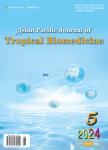Healthcare waste management in selected government and private hospitals in Southeast Nigeria
Healthcare waste management in selected government and private hospitals in Southeast Nigeria作者机构:Department of Pharmaceutical Microbiology and Biotechnology Faculty of Pharmaceutical Sciences Nnamdi Azikiwe University Agulu Campus Department of Clinical Pharmacy and Pharmacy Administration Faculty of Pharmacy Delta State University Department of Surgery Anambra State University Teaching Hospital Department of Pediatrics Anambra State University Teaching Hospital Department of Community Medicine College of Health Sciences Nnamdi Azikiwe University Nnewi Campus
出 版 物:《Asian Pacific Journal of Tropical Biomedicine》 (亚太热带生物医学杂志(英文版))
年 卷 期:2016年第6卷第1期
页 面:84-89页
核心收录:
学科分类:12[管理学] 1204[管理学-公共管理] 120402[管理学-社会医学与卫生事业管理(可授管理学、医学学位)] 1004[医学-公共卫生与预防医学(可授医学、理学学位)] 10[医学]
主 题:Healthcare waste Waste disposal system Government Private hospitals South-east Nigeria
摘 要:Objective:To assess healthcare workers involvement in healthcare waste management in public and private ***:Validated questionnaires(n = 660) were administered to randomly selected healthcare workers from selected private hospitals between April and July ***:Among the healthcare workers that participated in the study,187(28.33%) were medical doctors,44(6.67%) were pharmacists,77(11.67%) were medical laboratory scientist,35(5.30%) were waste handlers and 317(48.03%) were ***,the number of workers that have heard about healthcare waste disposal system was above average 424(69.5%).More health-workers in the government(81.5%) than in private(57.3%) hospitals were aware of healthcare waste disposal system and more in government hospitals attended training on *** level of waste generated by the two hospitals differed significantly(P=0.0086) with the generation level higher in government than private *** materials for healthcare waste disposal were significantly more available(P=0.001) in government than private *** was no significant difference(P = 0.285) in syringes and needles disposal practices in the two hospitals and they were exposed to equal risks(P =0.8510).Fifty-six(18.5%) and 140(45.5%) of the study participants in private and government hospitals respectively were aware of the existence of healthcare waste management committee with 134(44.4%) and 19(6.2%) workers confirming that it did not exist in their *** existence of the committee was very low in the private ***:The availability of material for waste segregation at point of generation,compliance of healthcare workers to healthcare waste management guidelines and the existence of infection control committee in both hospitals is generally low and unsatisfactory.



